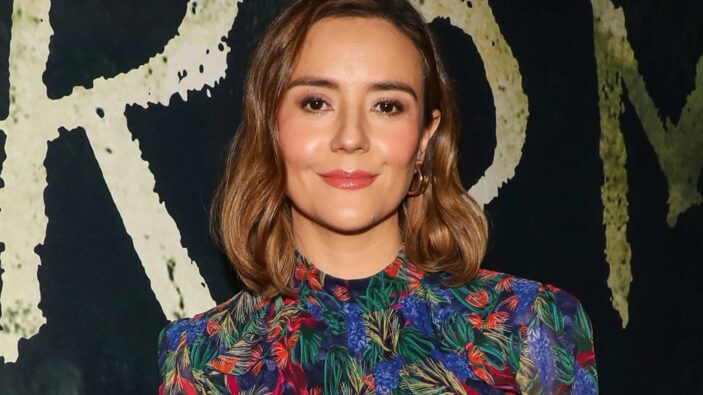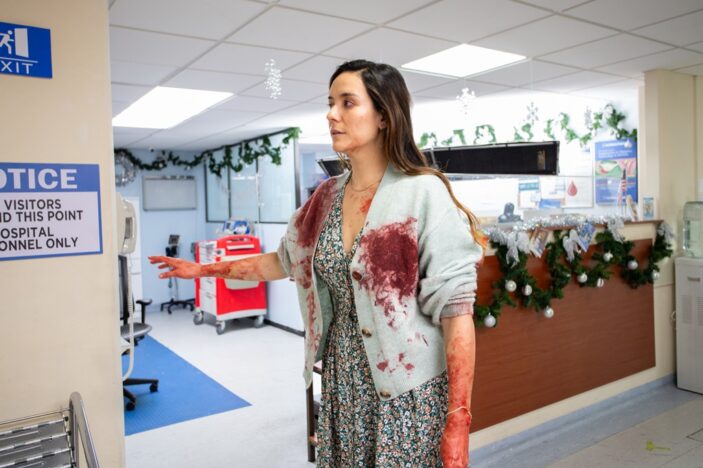
Returning to the American filmic scene for the first time in 20 years, John Woo’s Silent Night is a bold, visceral tale of revenge told in the most unique of ways.
Foregoing traditional dialogue, Woo’s violent, emotional action film emphasises the beating heart and the bloody pulp behind the slick choreography, with Joel Kinnaman leading the charge as a grieving father who is on the warpath following the brutal slaying of his young son.
Supporting Kinnaman throughout this thrilling epic is Catalina Sandino Moreno as his sorrowful wife, processing the loss of her son in a more introspective manner. Talking to Peter Gray ahead of the film’s release, the Academy Award nominated actress spoke of the creative freedom she had in creating her character away from the restrictions of a traditional script, and trusting her director’s unique vision.
Before getting to Silent Night itself, I wanted to ask you about the action genre in general and if, for you, there’s a particular film that stands out as a favourite?
Probably Kill Bill. (Volumes) One and Two. Those were my big (movies). I was obsessed with Uma Thurman for a very long time with that movie. Tarantino…I think it was incredible. That was my first big action film. Obsessed!
And with Silent Night, I went into this film knowing very little about the specifics other than no dialogue. But even still, I wasn’t expecting zero dialogue! You’re not learning lines here, per se, but I imagine there’s still a script or an outline that’s presented to you? How did this come about for you? And what was your reaction to John Woo’s idea of no talking and letting this all be an emotional and visual experience?
I thought it was fantastic. I mean, how amazing to be working with John Woo? Mission: Impossible. Face/Off…all these kinds of movies. Not only was this different for him, but it was different for me. It was a challenge to do. I remember when I was reading the script I thought I might need a little wording here and there, but when you watch the film it really doesn’t. You don’t need much dialogue. They’re grieving parents (and) there’s no words for grief. There’s no words for being heartbroken. There’s no words for being separated. There’s a lot of things I realised in the movie that (you) don’t need dialogue for. When you see two people grieving, you understand them and you feel for them. This movie has a lot of action, but it has a lot of heart, and it’s a great combination between those two worlds.
I was going to say that your character is very much the heart of the film. I think as an audience member you’re our emotional throughline. And that’s just as important as the action, as you said. As much as there’s action we need to feel for these characters. With Saya (your character), are you given an outline on who she is? Or do you massage this out with John and Joel (Kinnaman) and create this character yourself?
Yeah, I was given the freedom to create my character. With Joel, we worked a lot beforehand. We sat down and created scenarios. What would happen? What is going to happen? What could happen? Let’s just find these different things that we can go to. That was how we created our characters. When you are given a script like this, when they don’t tell you who she is or what she does for a living, it’s challenging. It’s challenging because (John) doesn’t tell you anything. He’s like, “Okay, see you Monday at 7:30.” It puts pressure on you, but I think it just gives me the freedom to do my work. And not just working in front of the camera, but way before that.
When I met Joel we sat down and talked about our ideas to see if they were too crazy far apart. We wanted to find that common ground, and we did. Our ideas weren’t too far apart from each other. Just working with him creatively was fantastic. That’s what you want in every single movie. You just want to get there and create with your director and your actor. Sometimes you are told what to do, and you’re a little bit like a robot, but there was such immense freedom to explore different things (here). Maybe because of the subject matter or what (John) was trying to convey, but I am glad that it happened because it made my experience much more fulfilling.

Without giving too much away, who is Saya to you? What was her profession?
She works at a bank. She goes to the bank, but she loves painting. She’s always loved painting. She decorates her house with her paintings. She’s very methodical. And I think when her son is killed, that part of her is broken. I don’t think you can come back the same person. If something like that happens to you, I think you have to reinvent yourself. That’s why in the last scene of the movie she’s painting. That’s who she is. That’s who she really is. I think the last scene of the movie is her (welcoming) a different version of herself, which I think is very uplifting and beautiful.
As you mentioned about being given the script, how much was actually written? Was there breakdowns regarding what characters were thinking? Or their actions?
There was no “You’re thinking this” or “You’re feeling this.” None of that. It was more “Saya goes into the house and she embraces Brian (Joel Kinnaman’s character).” I really appreciated the writer (Robert Archer Lynn) because he knew exactly what he was doing. He just gives you that freedom. But he put in moments where he feels we should know something (specific). It wasn’t detailed about what we had to do (though). If I’m sitting with Joel, maybe we (then) stand up, or we cuddle…it’s never ending to me. The script is one thing. John’s idea is another. My idea is another. Joel’s. It’s a combination of everything, which makes a great result.
It’s seeing films like this that really make you appreciate what goes on beneath the surface. Yes, it’s physical action, but there’s such a roundedness to it with your emotional outlay. It’s always so appreciated to watch a film and be taken aback by it breaking expectation…
I feel the same as you. I read the script and, I’m like, “I trust John Woo.” I trust him. He knows what he’s doing. But when I watched the film…I mean, the music is great, the DP, there’s a combination of so many talented people that have created this movie. It just makes me so happy to be a part of this wonderful collective of very talented people.
Silent Night is screening in Australian theatres from December 7th, 2023.
